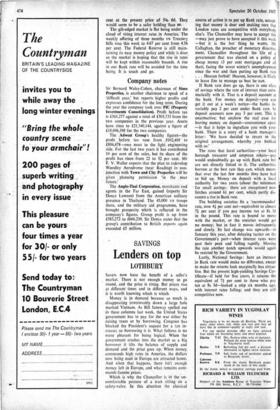Lenders on top
SAVINGS LOTHBURY
Savers now have the benefit of a seller's market. There is not enough money to go round, and the price is rising. But prices rise at different times and in different ways, and it is worth knowing which is which.
Money is in demand because so much is disappearing irretrievably down a large hole marked Vietnam. As Bill Janeway spelled out in these columns last week, the United States government has to pay for the war either by raising taxes or by borrowing. Congress has blocked the President's request for a tax in- crease; so borrowing it is. What follows is no more pleasant for being logical. When the government crashes into the market as a big borrower it tilts the balance of supply and demand and the price goes up. When money commands high rates in America, the dollars now being used in Europe are attracted home. And when that happens, there isn't enough money left in Europe, and what remains com- mands famine prices.
Which is why the Chancellor is in the un- comfortable posture of a man sitting on a safety-valve. In this situation the classical
course of action is to put up Bank rate, accept. ing that money is dear and making sure that London rates are competitive with everybody else's. The Chancellor may have to accept this —may just prove to have accepted it this week —but it is the last thing he wants. Mr Callaghan, the preacher of monetary disarma- ment, Chancellor throughout the life of a government that was elected on a policy of cheap money (3 per cent mortgages and all that), facing the worst winter's unemployment since the war and then putting up Bank rate . . . Heaven forbid! Heaven, however, is likely to leave Jim to manage as best he can.
If Bank rate does go up, there is one class of savings where the rate of interest rises auto- matically with it. That is a deposit account at the bank. For money on deposit—you can get it out at a week's notice—the banks in- variably pay 2 per cent under Bank rate. So deposit accounts now pay 3 per cent. This is unattractive; but anyhow the real case for leaving money on deposit—convenience apart —is that it helps to ingratiate you with your bank. There is a story of a bank manager's letter: 'We have decided to revert to the original arrangement, whereby you banked with us.'
The rates that local authorities—your local borough treasurer and umpteen others—pay would undoubtedly go up with Bank rate but are not directly linked to it. The authorities borrow at the best rate they can, which means that over the last few months they- have had to bid up. Money on deposit with a local authority for two years (about the minimum for small savings: there are exceptions) now fetches around 6* per cent, which partly dis- counts a rise in Bank rate.
The building societies fix a 'recommended' rate, now 41 per cent net—equivalent to almost 71 per cent if you pay income tax at 8s 3d in the pound. This rate is bound to move with the market, or the societies would get no money; but in fact it moves infrequently and slowly. Its last change was upwards—in January this year, after delaying tactics on the Government's part—when interest rates were past their peak and falling rapidly. Moving the rate another notch upwards would again be resisted by the Government.
Lastly, National Savings: here an increase in Bank rate would make no difference, except to make the returns look marginally less attrac- tive. But the present high-yielding Savings Cer- tificate—if held for five years, it returns the equivalent of 71 per cent to those who pay tax at 8s 3d—looked a snip six months ago. with interest rates falling; and they are still competitive now.


































 Previous page
Previous page